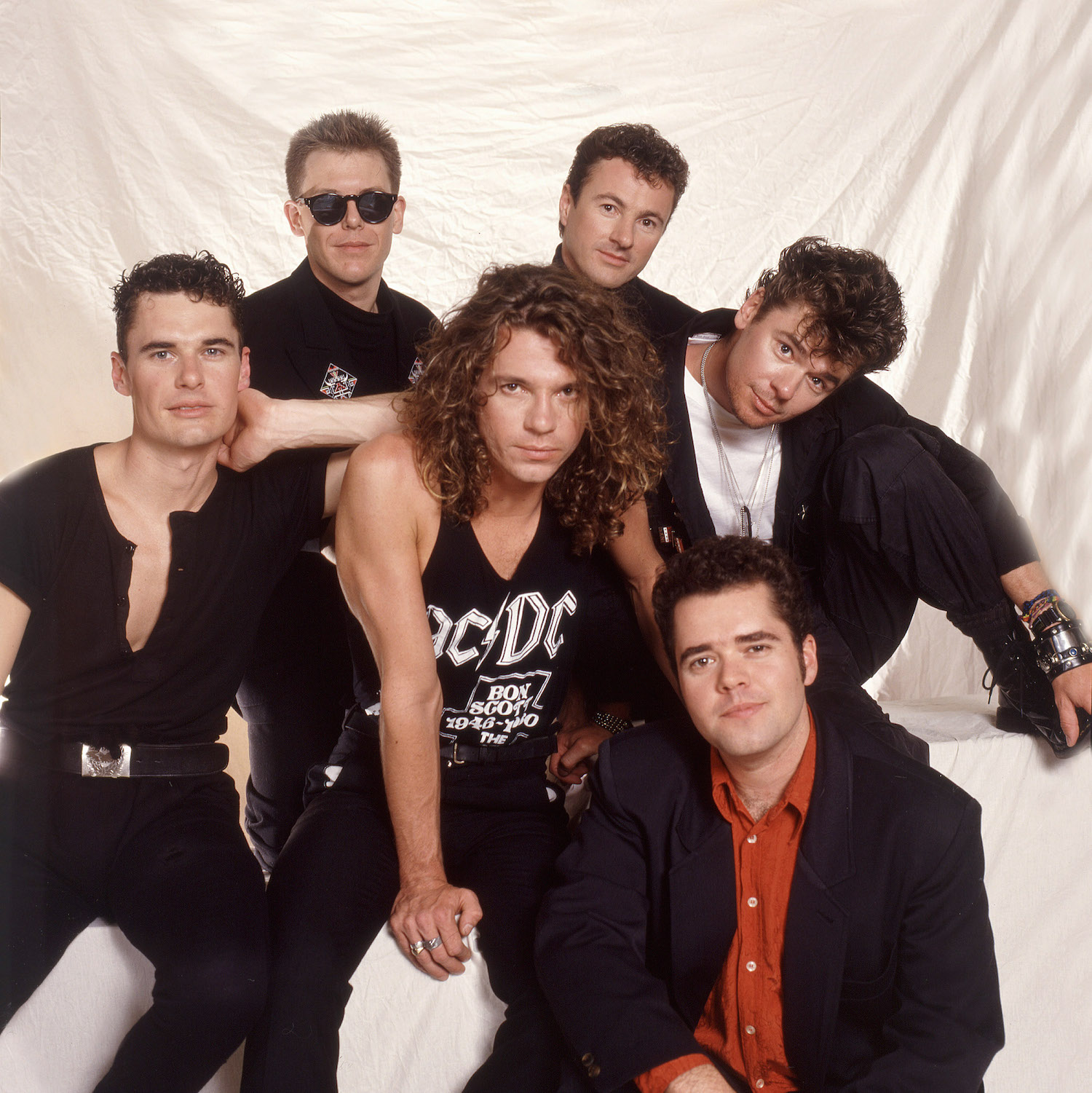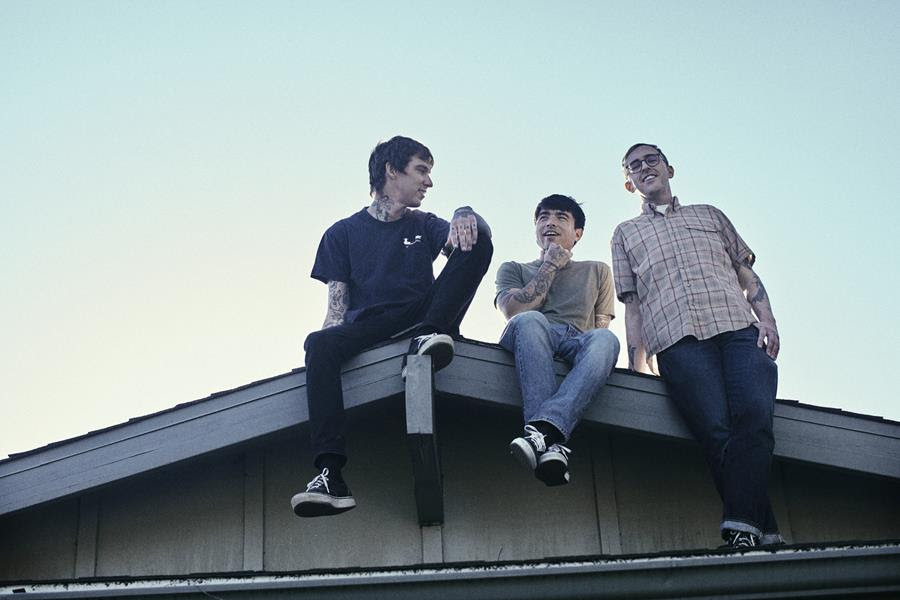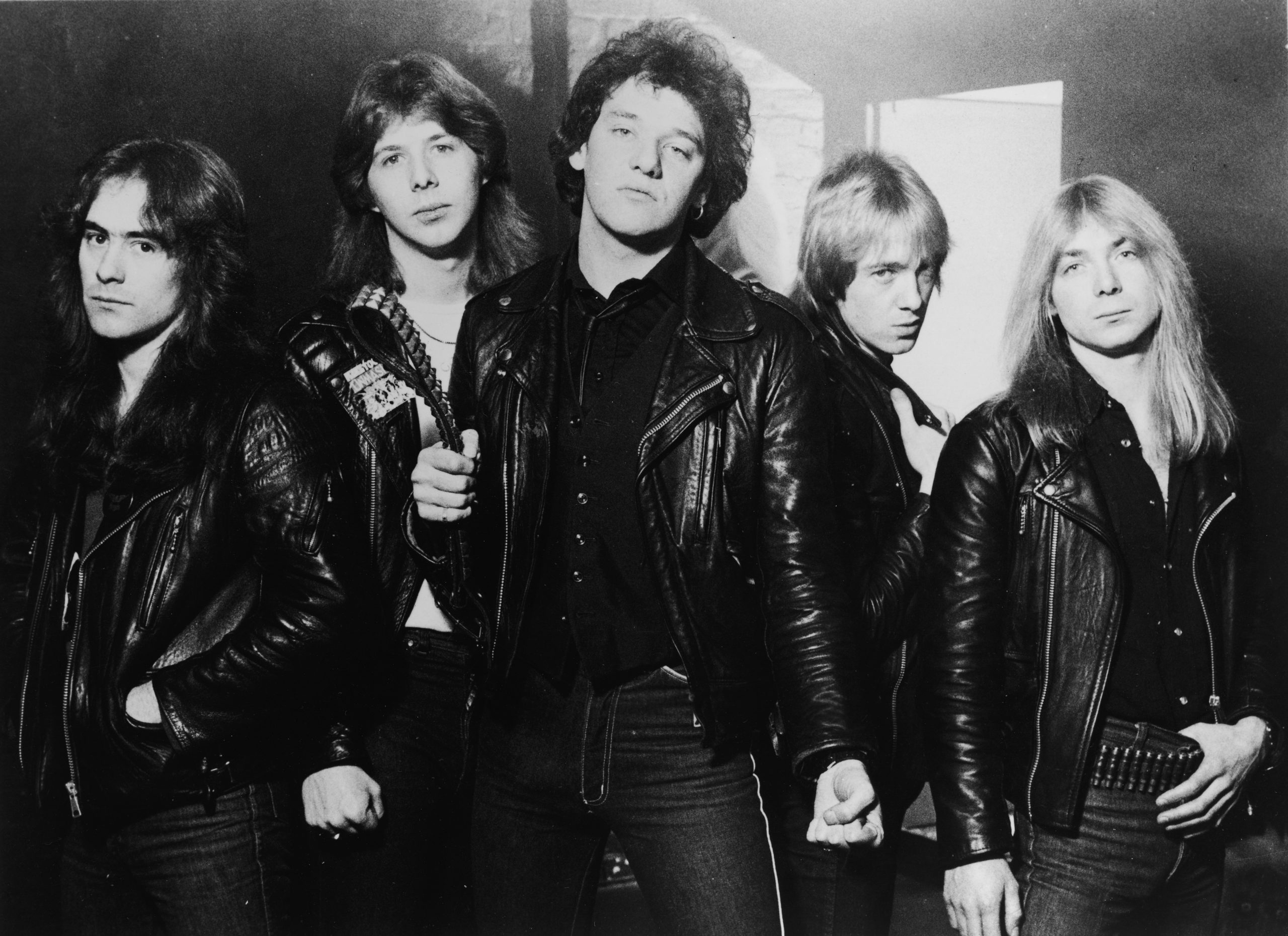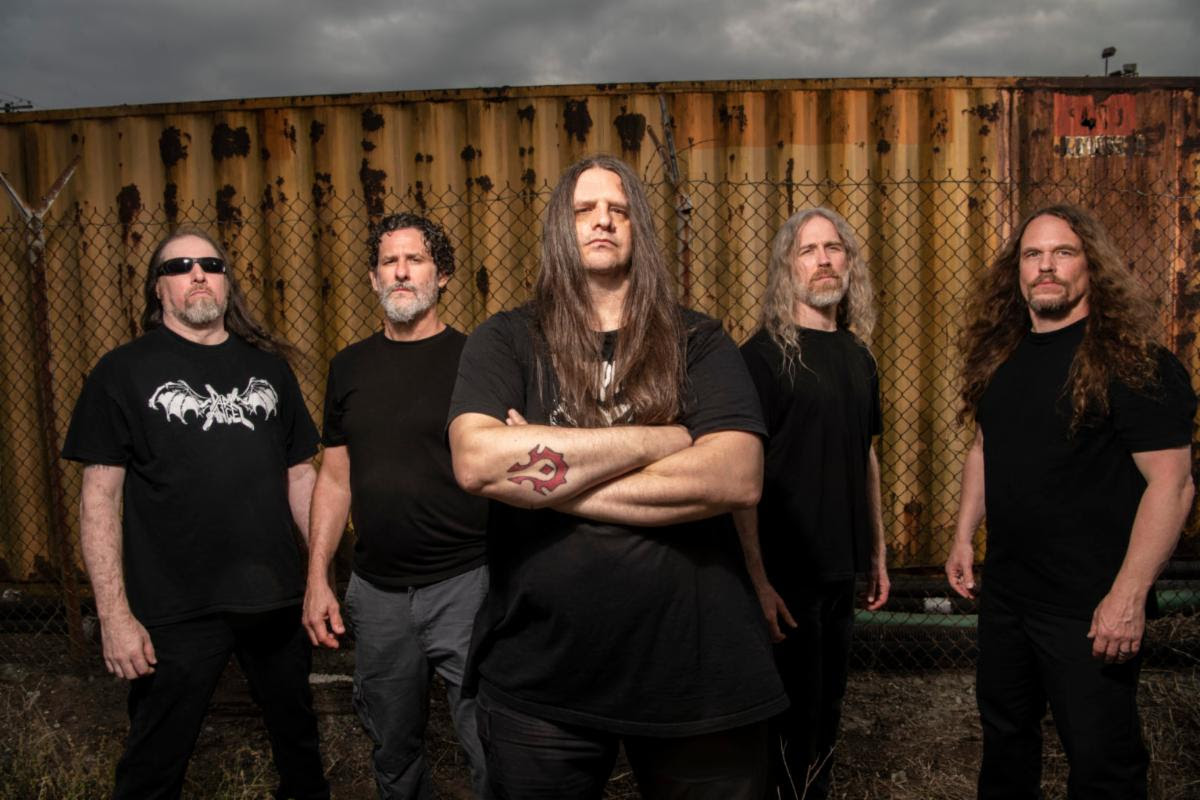"How can I call myself a straight man," a barback asked me and my friend, "if I would rather look at Michael Hutchence than all these pretty girls?" He returned to his duties, collecting empty glasses and wiping down the bar, and we were left to ponder this question alone. A TV in the bar was playing the video for "Disappear," the second single off 1990's X -- undoubtedly one of INXS's most sensual tracks and videos, in a long line of such tracks and videos. The answer, of course, is that Hutchence's charms know no bounds.
It's this that INXS is known for. From "The One Thing," their first U.S. single, through the massive hit "Need You Tonight" and into their minor '90s singles, Hutchence's sexuality is at the forefront. He had the feminine moves necessary to creating a Jagger-esque, feline presence. That sexuality -- so prevalent in every single one of INXS's videos, which were essential to their rise -- at times overshadowed the virtuosic songwriting and Hutchence's own singular voice, which could simultaneously snarl and tempt. In 1988, during the peak of their popularity, Rolling Stone wrote:
The latest chapter in the six-man band's steady rise has been accompanied by -- and is, in part, dependent on -- the emergence of singer Michael Hutchence as a sex symbol and media personality, a first-rate crotch throb sought after by fashion magazines, film directors and a universe of teenage girls.
INXS put earnest perversity in a salable package, giving listeners an unapologetic, smart salaciousness that couldn't be placed squarely in the "serious" alternative category or among pure pop. On their first two albums -- not initially released internationally -- INXS and Underneath The Colours, they were already displaying a prowess, writing songs like "In Vain" and "Stay Young," which still sound relevant today. As their fame got bigger and their sound became slicker, though, they were never considered a serious band.
But among musicians, at least, there seems to be a desire to revisit and restore INXS. Beck made KICK the subject of his Record Club in 2010, with St. Vincent, Liars, and Os Mutantes. Arcade Fire covered "Devil Inside" in Australia last year. Brandon Flowers and Bruce Springsteen have both separately covered "Don't Change" recently, and Courtney Barnett performed KICK in full in 2012 -- just her and a guitar. In June, Seattle radio station KEXP had a fundraiser with many local artists performing the songs of, solely, INXS. Bradford Cox says the new Deerhunter LP will sound like INXS, and Pledge Music teamed with T-shirt designer Astrella to release a previously unheard Hutchence solo track called "Friction."
We now have enough distance from Hutchence's death -- not to mention the strange spectacle of the surviving members of the band going on a Dave Navarro–hosted CBS reality show called Rock Star: INXS to find a new lead singer -- to properly assess INXS. We're ready, culturally, to take them seriously.
INXS's sound morphed over the years, moving from the ska-lite of their 1980 eponymous debut through the post-punk of Shabooh Shoobah into the perfected pop-rock of KICK and toward the alternately harder and more mature sounds of their mid-'90s albums. They struggled in the '90s to maintain relevance, as they had been marked as an '80s band and their, dare I say, excessive sound didn't work as well in a world taken over by grunge. But they never sat back and relaxed, always knowing their grip on relevance was tenuous, and it's evident on every album.
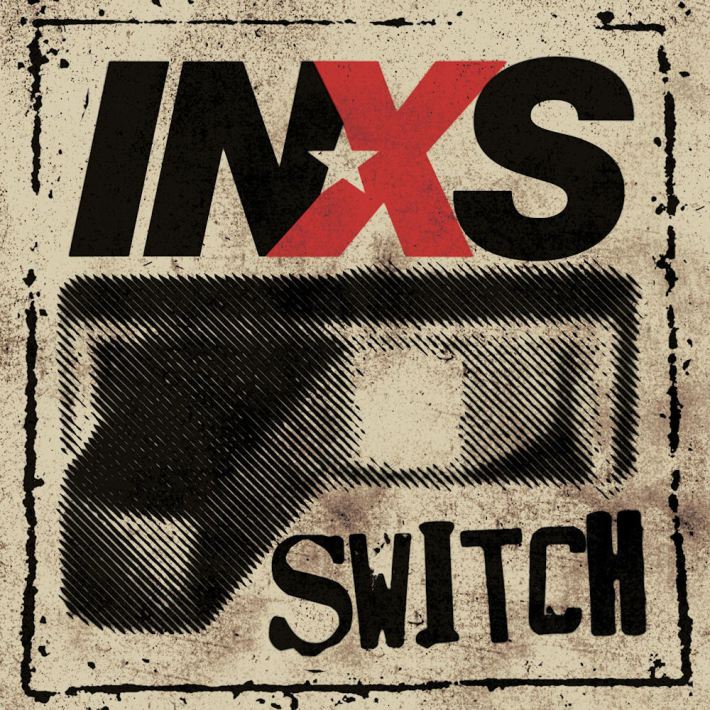
In 2005, after spending the years since Michael Hutchence's 1997 death performing here and there with one-off guest singers, the remaining members of INXS went on the CBS reality show Rock Star: INXS to audition new singers. It was a very specific American Idol, with Dave Navarro co-hosting to provide cachet and make the whole spectacle that much more depressing. The winner ended up being Canadian J.D. Fortune, who does a very good impression of the snarl that Hutchence perfected but lacks an authentic roughness, like most who are capable of performing well on singing competition shows.
Still, Andrew Farriss is writing most of the music, so it is an INXS album in the mold of their older work. But one certainly gets the sense that taking eight years off made him a bit rusty. They brought on Guy Chambers to produce, who's most famous for his collaborations with Robbie Williams, and Switch would probably make more sense musically as a Sing When You're Winning follow-up. "Hot Girls" sounds like a parody; "Devil's Party" invokes neither the spirit nor letter of "Devil Inside"; and the album's hit, "Pretty Vegas," while undeniably fun, leaves you cold and calls back to an INXS sound that they'd already seemingly matured beyond in the '90s. Without a singer who's in on it, winking as they try to pull you into their debauchery, everything singular about INXS falls apart.

INXS's 1980 eponymous debut didn't get a U.S. release. It's an unbalanced, ska-inflected album, on which Hutchence is clearly getting comfortable with his voice. He's often doing a very campy, Adam Ant–type accent -- but it has great moments. "In Vain" is a stunner, the precursor of all that would come, and "Learn To Smile" foreshadows the sound of the decade just beginning with a sunny-but-sad synth line. "Just Keep On Walking" was their first hit in Australia, and the album itself eventually went gold there.
It's clear that INXS are grasping to find who they are and taking cues from every sound popular at the time. They were still mainly known as a live band, and you can see that these songs might work in a small venue, but as one album, nothing makes sense. "Doctor," "Jumping," and "Body Language" are the most ska-like, and they simply don't work next to the pop-rock of opener "On A Bus" or new wave of "Newsreel Babies." Eventually, INXS would learn how to use horns to great effect. On this one, though, they're all over the place.
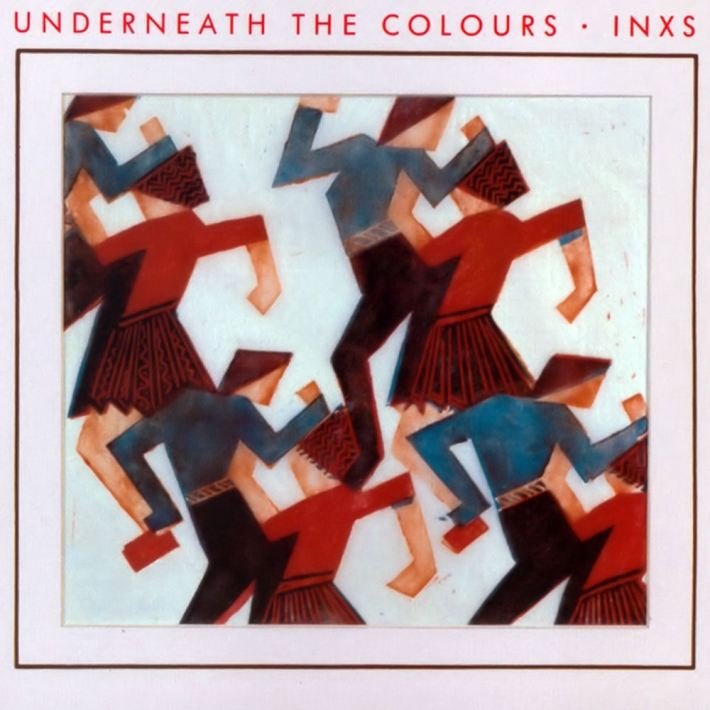
INXS's second studio album has touches of '70s Bowie and is, for the most part, purged of the ska of INXS. On this album, they were learning how to be a melting pot of sounds without any one specifically taking over, and were beginning to learn how to use their sax player to add color without having it be a driving force behind the music.
The first song and single, "Stay Young" -- which reached No. 21 on the Australian charts -- has the danceable beat and funky bass line that would become a signature of the band. It still has some ska bounce, but it's toned down by a big rock guitar line. The album's title track (and second single) is where you hear Hutchence doing Bowie, but also where you hear the band finding their talent for a restrained, melodic sensuality that they would use on their next album, Shabooh Shoobah. These singles were followed by "Night Of Rebellion," which doesn't quite jell. The band certainly sound more cohesive here than they did on INXS, but it wouldn't be until the next album that they figured out exactly what they'd been reaching for.
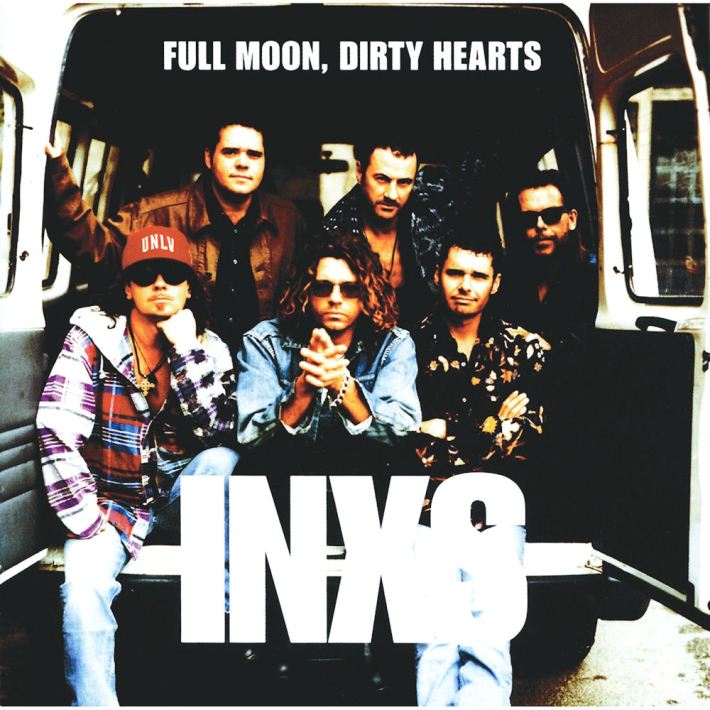
In 1993, INXS tried to harden up their sound. It didn't work. This album is their midlife crisis, yielding no hits and marking a sharp decline in sales, not even charting in the top 50 in the U.S. When they get slinky in the vein of their prior work, like on "The Gift," they are at their best -- it truly sounds like KICK with a rock heart. But they fall off the rails flailing for a hit on songs like "The Messenger," which sounds like the Black Crowes. On the final track, "Viking Juice," Hutchence does a cringe-worthy Jim Morrison–style spoken-word performance.
Full Moon, Dirty Hearts was received positively by critics at the time of its release, framed as a return to the band's pub-rock roots -- the roots established on albums released only in Australia, which are decidedly quite mediocre. They made ambitious videos for each track on the album and clearly believed they were on a course to re-define themselves. Instead, they took four years off before their next album, and when they reconvened, they returned to the sound of 1992's Welcome To Wherever You Are.
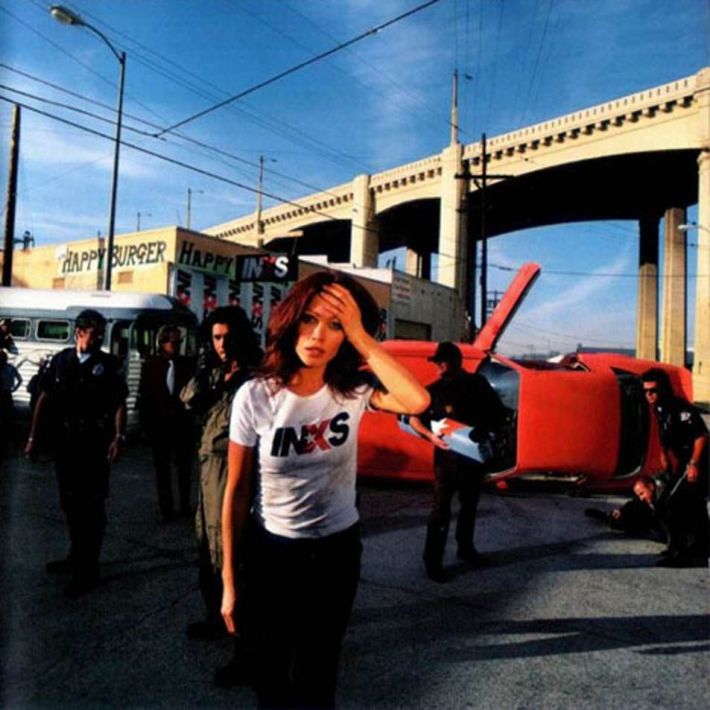
If you can describe the quintessential INXS song as having a driving groove and a rhythmic guitar line, "Elegantly Wasted" is without a doubt a quintessential INXS song. Elegantly Wasted, the album, starts off with the fun, sexy rock of "Show Me (Cherry Baby)" before moving into the title track and then becoming another solid example of the more mellowed-out, mature sound INXS embodied on Welcome To Wherever You Are.
The album got mixed reviews upon its release, with Rolling Stone writing, "INXS haven't lost their flair for making sexy, streamlined funk-rock confections, but 10 years after 'Need You Tonight' hit the top of the charts, the sinuous dance grooves and crackling bursts of guitar in new songs such as 'Elegantly Wasted' and 'Don't Lose Your Head' don't seem very fresh." Not fresh in 1997, perhaps, but with the benefit of almost 20 years of hindsight into a Hutchence-less world, we are lucky to have them. Like KICK, they stand up because of the band's singular "flair" for creating this kind of song, which is no longer made.
It's difficult to listen to this album without having Hutchence's death in the forefront of your mind. He gives looser-than-usual vocal performances on ballads "Everything," "Searching," and "I'm Just A Man," and the nearly six-minute-long "We Are Thrown Together" have a touch of desperation never before heard from INXS. It could have been as simple as aging, as being two decades into existing as a band, or that Hutchence now had a daughter. But it truly does seem like they were preparing for another shedding of skin, another search for a new sound. Instead, they returned in 2005 with a singer they found on a reality show.
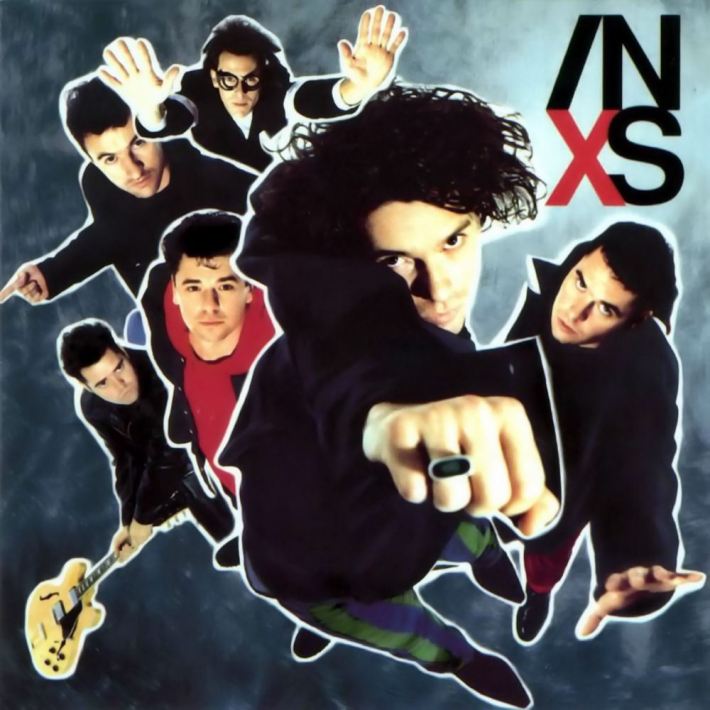
X suffers from being front-loaded, and from quite blatantly attempting to replicate the success of KICK almost by numbers. It starts with the undeniable "Suicide Blonde," and goes straight into the sultry "Disappear." "By My Side," its love ballad, is string-filled and working toward a booming crescendo, but it never quite reaches the urgency of KICK's "Never Tear Us Apart." Even the videos for "Suicide Blonde" and "Disappear" mimic that of "Need You Tonight," with the band sliding in and out in mostly black-and-white.
"Bitter Tears" and "The Stairs," though, are where you see the band further growing into themselves and forging something a bit new that they'd explore more deeply on their next album, Welcome To Wherever You Are. Lyrically, "The Stairs" revisits Hutchence's obsession with the essential elusiveness of universal human connection over a hammering beat; "Bitter Tears" tones down the overt sex while staying visceral, and it uses horns sparingly to great effect.
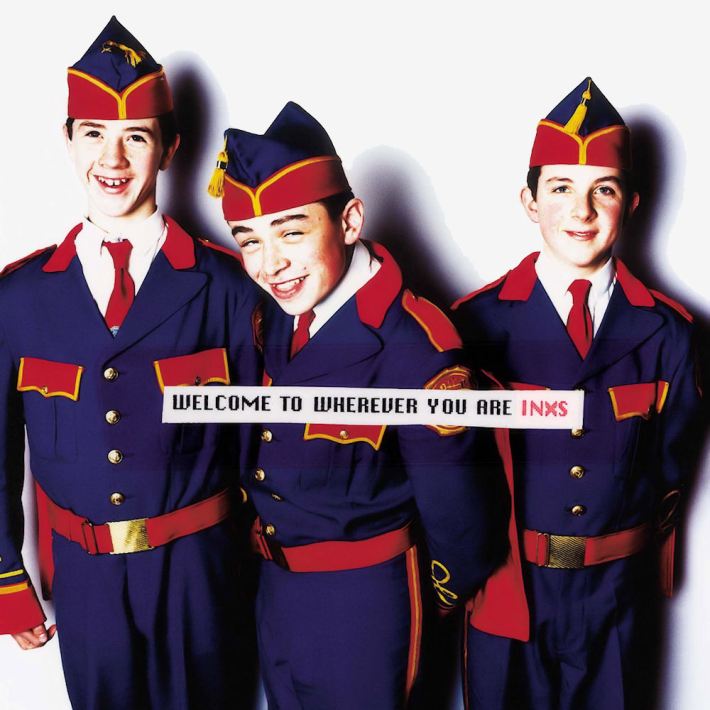
After 1990's X didn't mimic the success of KICK, INXS returned with 1992's Welcome To Wherever You Are. They brought back producer Mark Optiz, who'd worked on their third album, 1982's Shabooh Shoobah, which had established the band outside of Australia. It seems to kick off a new era of the band -- calmer, more mature, less intensely sexual but still undeniably sensual.
The Eastern sounds of the first track, "Questions," lead you to believe you're in for an album from a band that doesn't know how to cope with their own mortality so must borrow from other cultures, but it blossoms into their best work of the '90s. The second track, the Andrew Farriss–penned "Heaven Sent," gives us a processed Hutchence vocal that lets his voice mix in with the instruments, providing less of the backing-band sensation that sometimes befell INXS. Effects are used on his vocals throughout the album -- such as on the stadium-ready "Communications" and "All Around" -- which adds to the feeling that this was a band shedding its skin once again.
Its biggest Stateside hit was "Not Enough Time," a toned-down, bass-y love song with a piano coloring Hutchence's gravelly vocals. "Beautiful Girl," also a single, was written by Andrew Farriss alone and was also a moderate chart success, hitting No. 10 on the Modern Rock chart. Since Shabooh Shoobah's "To Look At You," he'd been proving himself the sweet counterpoint to Hutchence's sex, and this is his most overt display and probably the best love song in a catalogue full of come-ons.
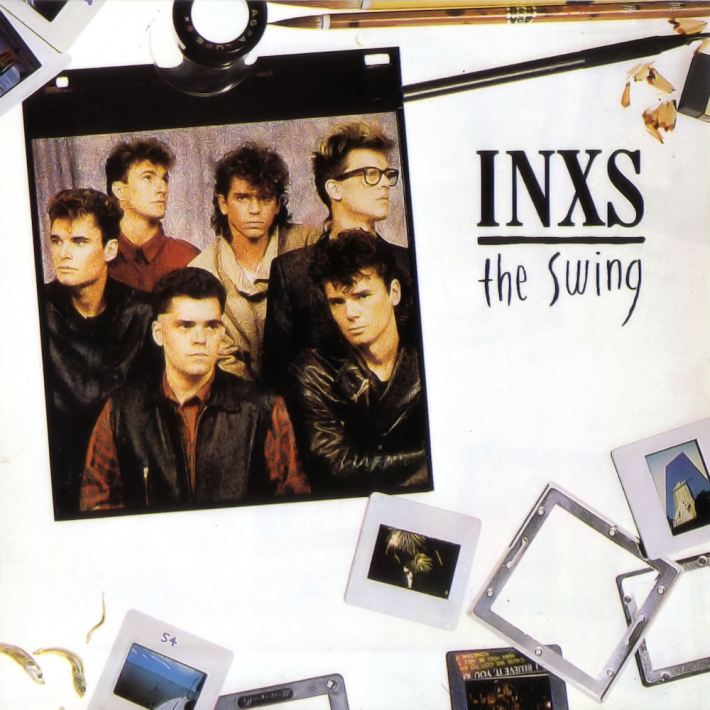
After breaking into the States with 1982's Shabooh Shoobah and touring with Adam Ant, INXS adjusted on The Swing in 1984. It opens with the single "Original Sin" -- which only reached #58 on the U.S. Billboard Hot 100 -- establishing that they were the same band but definitely had more money and the intention to make bigger hits. Its smooth but far poppier sound contrasted with everything they'd previously put out and is somewhat jarring when juxtaposed with the understated, cohesive sound of the prior album.
It's on this album that the tension between early INXS and what the band would become is most evident. The authoritative title track is followed by the more sedate "Johnson's Aeroplane" and "Love Is (What I Say)" -- both quite polished but still more in line with their earlier albums. But despite this tension, it is some of their best work.
On "Dancing On The Jetty," they do Midnight Oil better than Midnight Oil: lyrics about the world arguing, a video of a performance shot among ruins interspersed with footage of protests, police violence, and pain, packed into a song with aggressive verses and an addictively melodic chorus. The aforementioned "Love Is (What I Say)" is restrained in a way the band wouldn't be again until the '90s.

Listen Like Thieves came out in 1985, and it solidified the band's move from soft-edged post-punk to danceable pop-rock -- which they'd perfect on their next album, 1987's KICK. It was their Stateside breakthrough, hitting #11 on the Billboard 200 chart. "What You Need" kicks off the album with false starts before its ecstatic, horn-filled eruption, and it became their first top 5 hit in the U.S., confirming that Farriss and Hutchence were the band's principal songwriters.
Their "Kiss The Dirt (Falling Down The Mountain)" and "Shine Like It Does" give the album an anthemic heart, before it returns to the band's roots in the Kirk Pengilly- and Hutchence–written "Biting Bullets," a pure rock song in the vein of their first three albums. Farriss' "This Time" has the vibe of a more filled-out Shabooh Shoobah track, seemingly made in the "Don't Change" mold.
It's clear throughout that there's a tension they're working through, a striving toward evolution as they grasped for fame outside of Australia, and they were doing so right in the middle of the '80s. It wouldn't be the last time they'd have to adjust their sound, but it was their most successful switch-up.
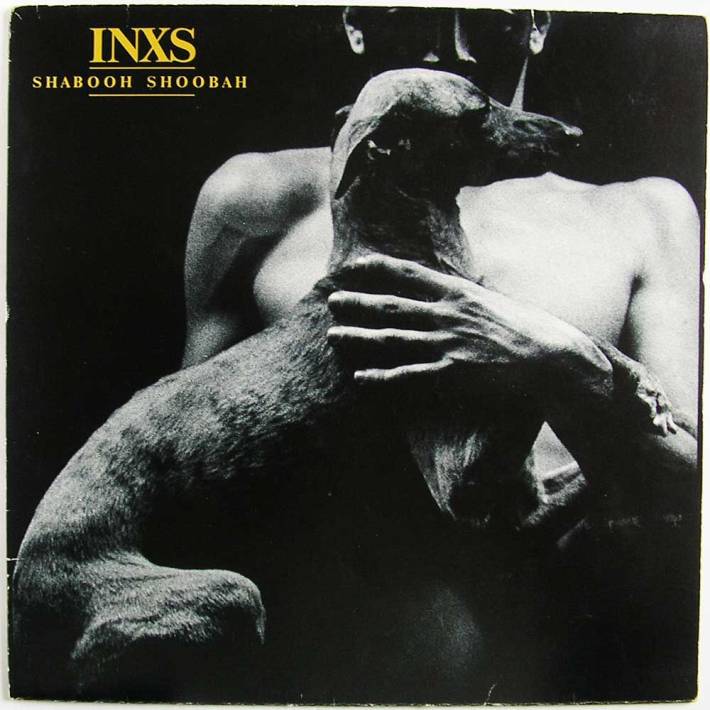
Like KICK, Shabooh Shoobah is packed from top to bottom with songs that perfectly communicate the essence of this band: cheeky, sexy grooves with post-punk punch. Unlike KICK, it is not an album that would pack stadiums. "Don't Change," which closes the album, is perhaps INXS's most anthemic, charged, and ecstatic single. In present-day nostalgia for the band, it is probably the most played and well-loved, even more so than "Need You Tonight." The album was their first U.S. release, peaking at #46 on the Billboard Hot 100, and presents a band with a far more cohesive vision than their first two albums, as well as a singer who's come into his voice.
The album begins with "The One Thing," which was also the first single. It hit #30 on the Billboard Hot 100 in 1983, aided by the success of its debauched video going into heavy rotation on MTV. This was the true start of Andrew Farriss and Michael Hutchence emerging as the band's principal songwriters and hitmakers. They're solely responsible for five out of 10 of the tracks on this album.
One of the best songs here, though, is the Hutchence-Pengilly collaboration "Golden Playpen," a thumping, passionate celebration of drunkenness. As is characteristic of Pengilly's songwriting, it's got less groove and more rock -- and a lot of good sax. "Jan's Song," one of the last tracks on the album, is seemingly about the plight of aboriginal people in Australia, establishing the mild political consciousness that would pop up on future albums.
It closes its second side with "Old World New World" and "Don't Change." When you listen to these back to back with your mind on the short past and longer future of INXS, they present a perfect juxtaposition. The former has a funkiness and immaturity more in line with their first two albums, while "Don't Change" is epic. It comes in slowly, announcing itself with Andrew Farriss' unforgettable synth line before the guitar tease and, finally, the drums kick in. This is Michael Hutchence truly debuting himself as a serious singer, giving us the full force of his ability to play the winking ingenue while being in complete control. Just as its intro is teased out, so is its outro, leaving you eager for whatever is going to come next from these guys.
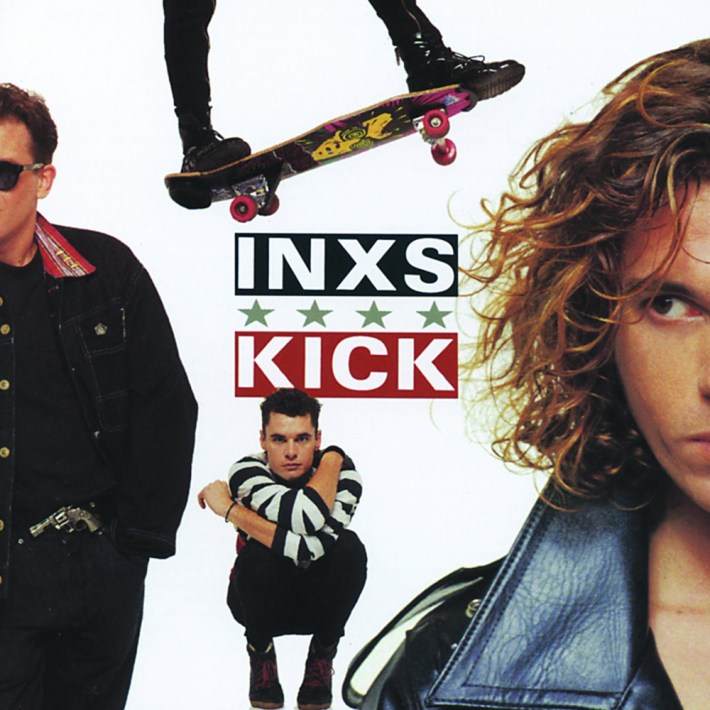
Almost every song on this album is iconic. It went 6x platinum in the U.S. and 7x platinum in Australia, and eight of its 12 tracks were technically singles -- and four of those were top 10 hits in the U.S. The video for "Need You Tonight/Mediate" won five awards at the 1988 MTV VMAs. Suddenly, with an album that their record company initially hated, INXS were the massive success they had been hinting at becoming since the breakthrough of their third album.
Nine of the album's 12 songs were written by Andrew Farriss and Hutchence. "Guns In The Sky" is Hutchence's doing alone -- a simple but effective opener, with lyrics characteristic of Hutchence's political sensibility, that establishes a level of sonic excitement that barely lets up until the album ends. With "New Sensation" and the command to "live, baby, live," they continue to set the listener up for a string of powerful songs without stepping too far into new territory -- it's a clear sibling of "Original Sin," just stripped of new-wave pretensions. "Devil Inside," "Need You Tonight," and "Mediate" is the trio that firmly establish Hutchence as the sex symbol and INXS as the band you don't know how to categorize. As Rolling Stone wrote in another 1988 feature on the band, their songs "are received as favorably in dance clubs as they are on rock radio."
The album is broken up in the middle with a cover of the Loved Ones' "The Loved One," a song they'd released as a stand-alone single in Australia in 1981. Its bluesy vocals and groove are suited to the tone of the album as a whole, and here it reboots it for its second half. "Wild Life" is a sibling of Listen Like Thieves' "What You Need," again proving that on KICK, what INXS did correctly was take everything that worked on their prior five albums and distill it into songs that showcase their unique talent for funk-rock in a pop package. One feels like "Wild Life" would've been a single on another of their albums, but here it works as a bridge among much stronger songs, leading us into "Never Tear Us Apart."
Shot on a cloudy day in Prague, the video for "Never Tear Us Apart" is as iconic as that of "Need You Tonight." With his curly hair in his face and his long, brown coat, Hutchence is a portrait of the wounded lover. This song has one of his strongest-ever vocal performances, colored by a touch of theatricality -- necessary to making us believe this is a man who would truly try to make wine from your tears. And because this is an album that won't let you rest, next is "Mystify," with more powerful vocals and a breakdown during which you can almost hear the stadium audience clapping along.
The urgency of the first two songs truly returns on the title track and continues in "Calling All Nations" -- another of Hutchence's prayers for a better world, this one asking all nations to "come on down to the party," which he makes sound moderately not-corny by virtue of his magnetism -- before ending with one of their most American-sounding songs ever, "Tiny Daggers." It's a huge closer, calling back, maybe, to the decision to put "Don't Change" at the end of Shabooh Shoobah, another dare to keep you interested, to keep you eagerly awaiting their next move.
The incredibly popular video for "Need You Tonight/Mediate" is an encapsulation of the major tension that plagued INXS throughout their run. In "Need You Tonight," Hutchence is at the forefront, shirtless, with the word "SEX" literally pinned to his leather jacket. The drummer, Jon Farriss, wears the band's own shirt. Then "Mediate" is a play on Bob Dylan's "Subterranean Homesick Blues." Always, they were torn between being an elevated boy band and serious musicians. Maybe only now can we believe that these things don't need to be mutually exclusive.
